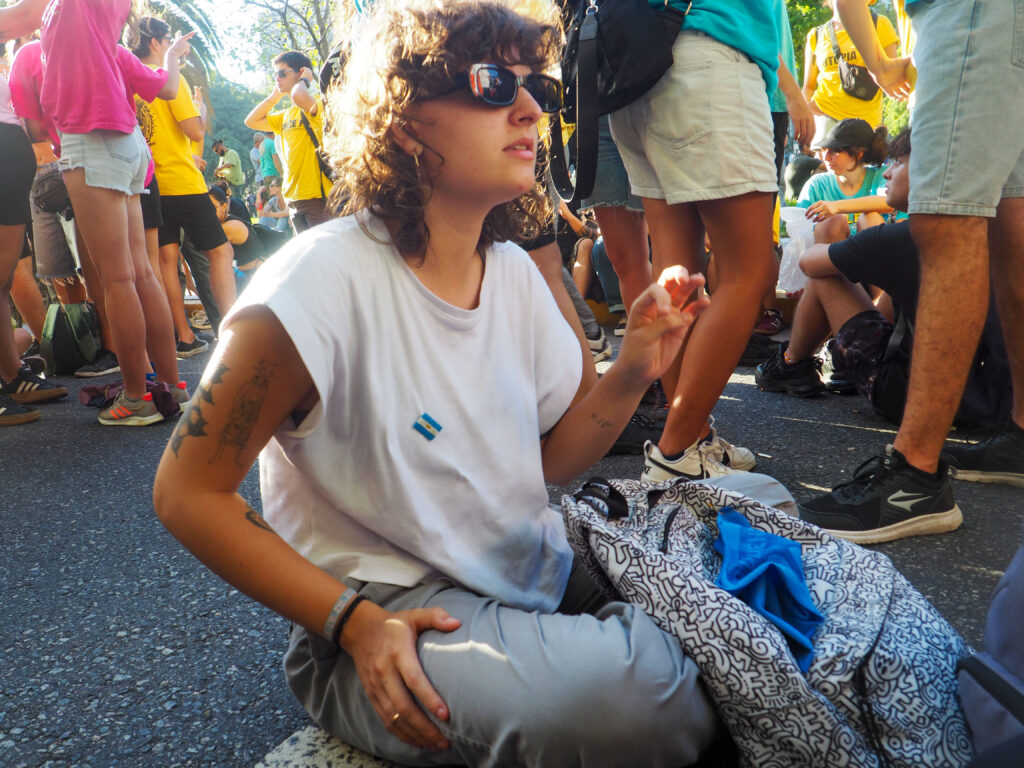“I’d rather be here than on my phone at home” – Visiiri joined Penelope at a protest in Buenos Aires
21-year-old Penelope participated an anti-government protest in Buenos Aires, the capital of Argentina in South America. Frustrated by the political situation, the student says it is better to go on the streets than stay home on your phone.
Original text and pictures: Salla Rajala
Translation: Isabel Lehtikallio
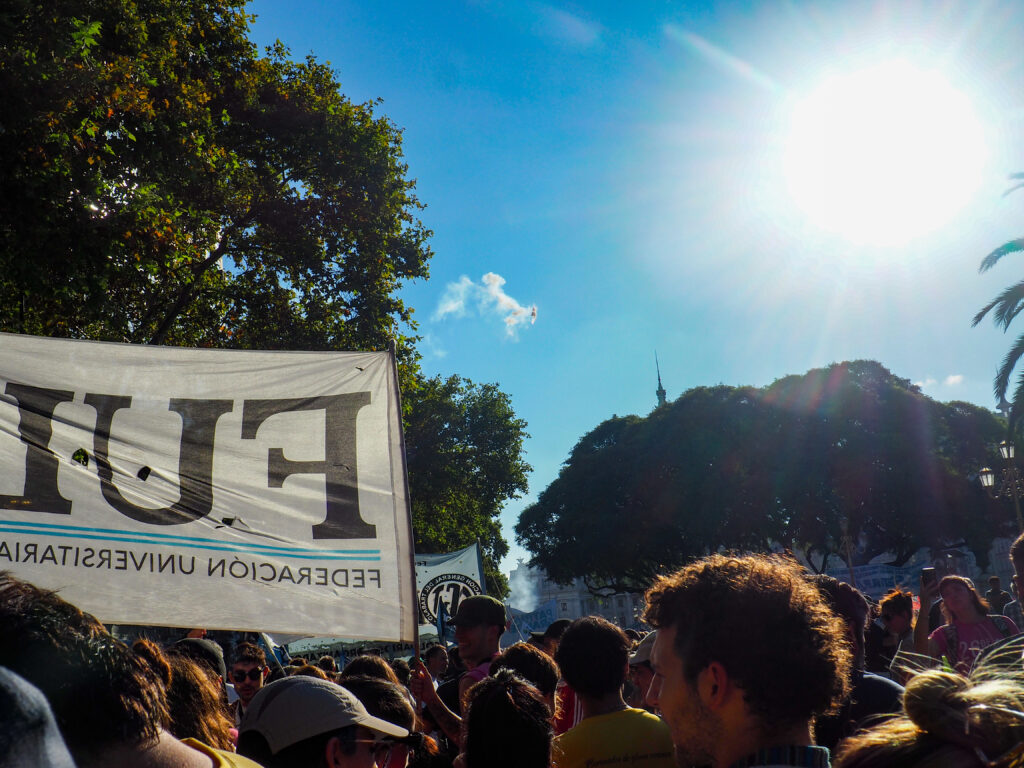
It is a bustling day. Today, on a Wednesday afternoon, people flood into the vibrant capital city of Argentina, Buenos Aires, from as far as the surrounding cities to protest against the pension reform outlined by President Javier Milei’s government. This has already happened on many consecutive Wednesdays.
However, it is not only about retirees. They march in the frontlines, but people of varying ages are participating both to support the retirees and marching for personally relevant matters.
Throughout Wednesday, the protest is on everyone’s lips. National intercom announcements are broadcasted at the train stations, reminding that violence is not a way to demonstrate.
It is rumoured that cell service will not be available in the city centre during the protest, making documentation of events futile. Each camp seems to be spreading their own propaganda.
The metro line operating in the protesting area is closed. Red, old-fashioned school buses transport the masses, and crowds are walking on the streets with flags and signs under their arms.
Today’s protest is anticipated to be impetuous and violent. Many people recommend opting out of it. I get specific instructions from my flatmate: pack lemons, a beanie, and a scarf as protection against tear gas. Look after your belongings because large crowds are a pickpockets’ feast.
Upon returning home, it becomes clear why my other flatmate has not answered my messages. Their phone has been stolen in the crowds.
Feelings run high in the face of higher education budget cuts
Penelope is a 21-year-old student. She is waiting for her friends at the street corner, a couple of blocks away from Congress Square. She has a backpack resting on her stomach, covered with a sheet whose writing defends public university education, “Yo defiendo la educacion publica.”
She attends a public university in a nearby city and has arrived by local train to do her part in protesting.
“I’d rather be here than at home on my phone”, Penelope says.
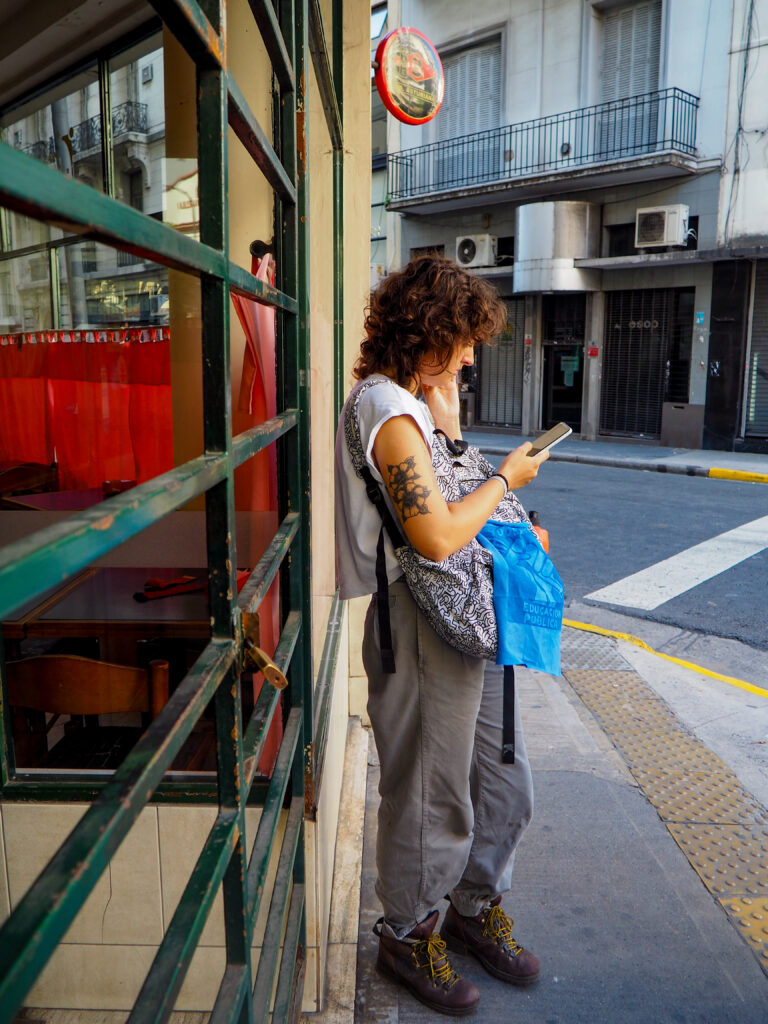
Soon, her friends Julieta and Olivia arrive, and the trio throw themselves into a group hug.
The friends got acquainted in university. They all study industrial design. On the side of her studies, Penelope works as a freelancer but hopes to find a full-time job.
They are shocked that President Javier Milei was elected to lead the country 18 months ago. They do not share Milei’s values and are, politely put, dissatisfied with his politics.
Milei has often been compared to the president of the United States of America, Donald Trump. He has also followed Trump’s footsteps in several matters. For example, at the beginning of the year, both countries announced their withdrawal from the World Health Organisation (WHO).
Milei has, among other things, wielded a chainsaw and declared his support for organ trafficking. He has implemented manifold of austerity measures. During his term the national currency, peso’s value has more than halved from its original value.
Milei’s election has had an effect on the country’s economics, including disinflation and increased investments. However, the citizens suffer from numerous issues. Approximately half of the population lives below the poverty line and the government’s food aid has been ceased.
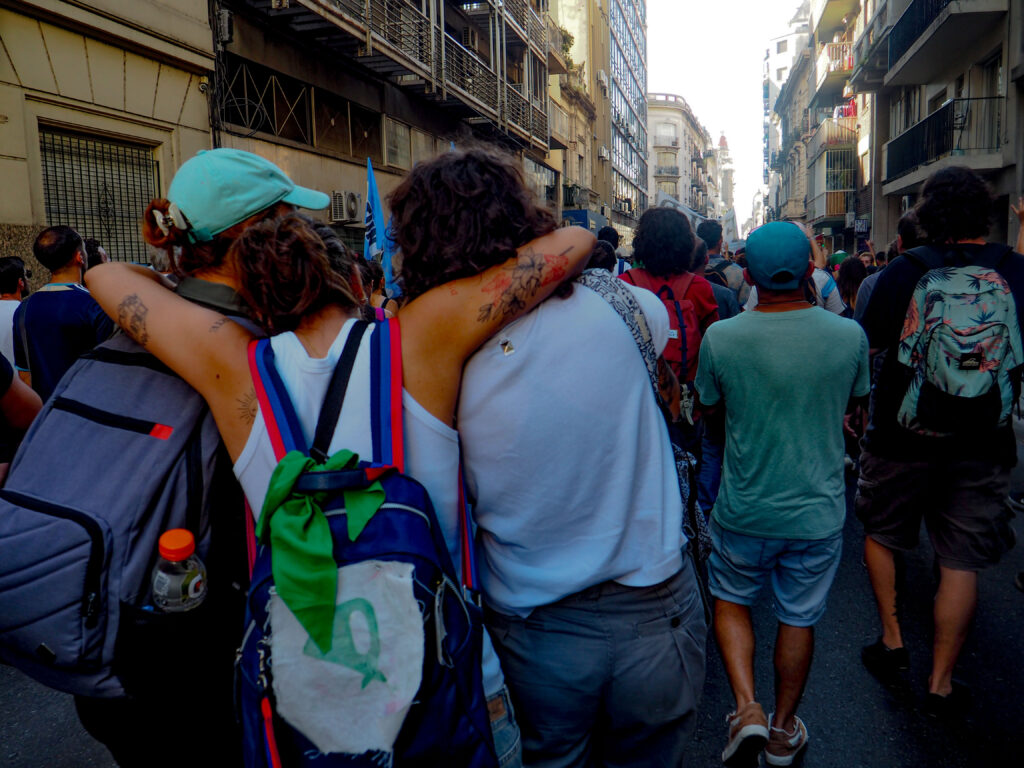
At the core of the financial cuts is Milei’s will to significantly decrease the government’s role. Among other things, this becomes apparent in the funding for public universities. Prior to this Wednesday’s protest, the universities’ teaching staff have been on a two-day long strike.
Penelope, Julieta and Olivia fear that as a result, public universities will lose their significance and higher education studies will accumulate more and more for those who can afford private university education.
Aftermath of the previous week
From all around the Congress Square, protesters have begun journeying toward it through the narrow streets surrounding the square. They carry with them Argentina’s national flags, different trade unions and departments’ flags alongside slogan sheets. People are rhythmically clapping their hands and belting out merciless songs about President Milei and the Secretary for Security, Patricia Bullrich.
Bullrich’s name is at the forefront of the public’s mind specifically because under her orders, the police have used excessive force in the previous week’s protest.
The triad is amused when pondering how the insults would translate into English. “Impossible to translate.”
The aftermath of the previous week is still being discussed. Independent photojournalist Pablo Grillo, who was reporting on the protest, suffered a hit to the head. Currently, he is in critical condition in the hospital, and journalists are enraged, and the city has filled with posters demanding justice for Grillo.
Protesting in Argentina is extremely organised. Organisations and leftist parties pay participants and to some it is their primary “profession”.
There is nothing new about the protests but from Penelope’s perspective, they have become more violent and “ferocious” after the presidential elections in 2023.
Penelope tells me that she has participated in protests for some years. On her first time protesting, she marched for abortion rights.
Duration and procession of a protest is a mystery
The sun is beating down, and heat becomes condensed in the middle of the human masses.
“How hot can the sun really be?” Penelope bemoans.
The trio have scarves with them in case of tear gas.
During the previous week, I happened to get off the metro in the middle of a protest and experienced how tear gas makes your eyes run. I hope that won’t happen this time.
Additionally, the friends retrieve water and snacks from their backpacks. Olivia has brought Penelope a cute avocado pen as a gift, which makes them laugh.
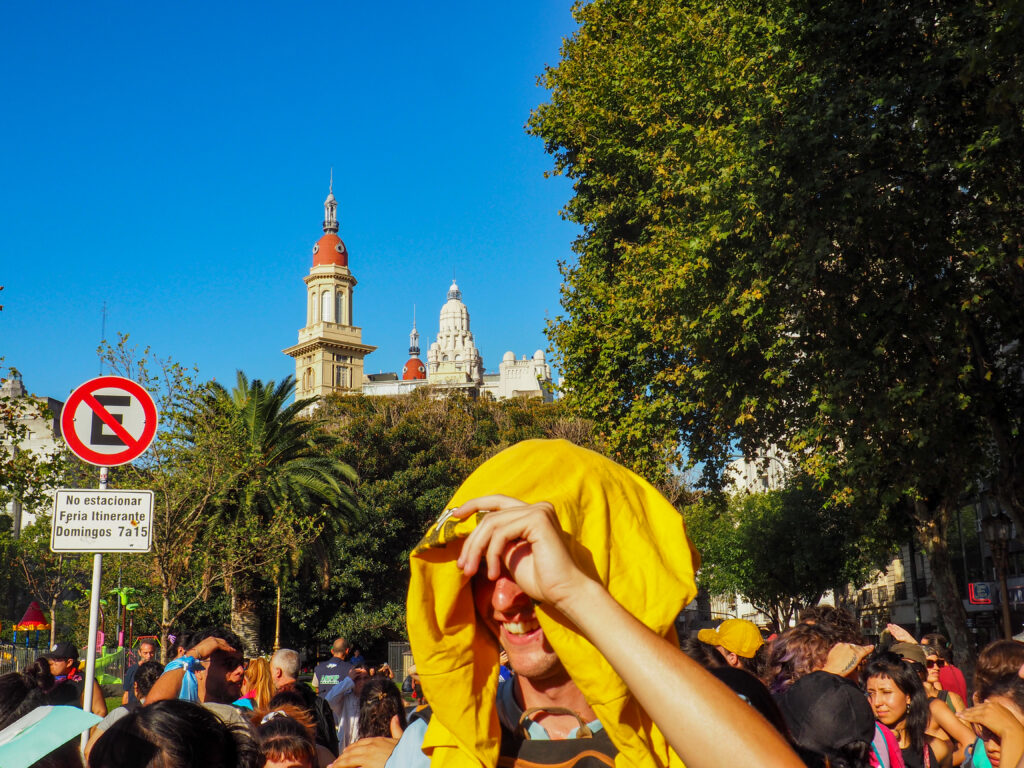
Julieta’s father is also participating in the protest. He comes over to say he is moving slightly further away. The friends find it cute how the father looks after them.
Our procession has stopped at the central square with the Congressional Palace located at the side of it. We wait whether it is possible to proceed further or if a police front is awaiting us.
The drums are thundering, people are yelling, and smoke ripples in the air. Then, a bit further away, loud bangs ring out when protesters shoot smoke bombs into the cloudless sky.
Bang. Bang. Bang.
Although the bangs sound vicious, we do not see dangerous situations or violence near us.
“What happens next?” I wonder, when we have been standing in the same spot for a long while.
“You never know if it’ll last half an hour or three hours,” Penelope explains and looks around.
Last time, the length of the protest itself was shorter than her trip to the capital.
Political views tear relationships apart
As it is uneventful for a while the friends sit down on a shaded patch of grass and begin to discuss their shared courses. Initially they were drawn together by their shared political views at the university.
Political views have the potential to also tear relationships apart. All three have had situations where differing political views with relatives or friends have led to them going no-contact.
“Our country is so polarised nowadays. There is no consensus or space for discussion”, Penelope describes the situation.
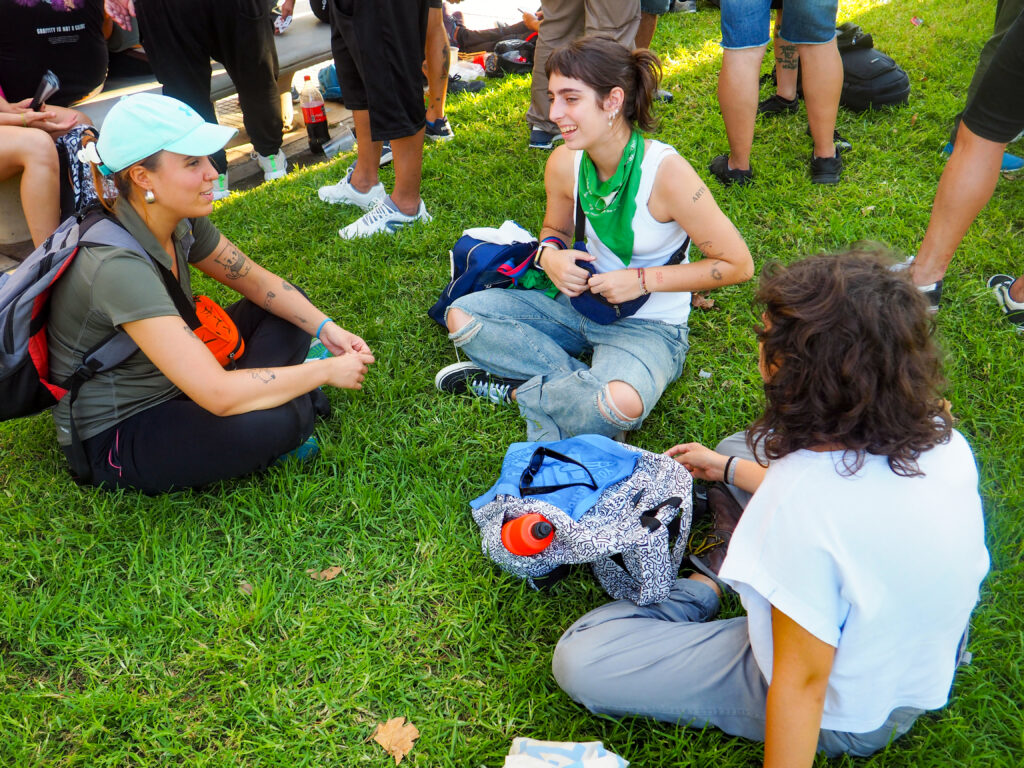
The trio think that it is not so much about political parties but about values of which they are not ready to debate.
“Out of the blue, we no longer share the same thoughts on human rights.”
The protests also divide the population: some sympathise with the retirees, whilst others think that retirees are an appropriate group to target with austerity measures. Around half the citizens support Milei’s cut-back politics.
Penelope foresees a multitude of worries in the future, but despite it all, she is not afraid.
Calm atmosphere this time around
It seems that the situation will not develop today. The majority of the university community members begin to trickle away from Congress Square the same way they arrived.
People squeeze back into the buses and return to their homes near and far. In a week, many will return again to this place.
However, Penelope wants to stay and heads off to the thicket of protesters attempting to move closer to the Congressional Palace.
“Bye-bye! Take care of yourself”, we say, going on our separate ways.
Later she messages that she marched a half hour more. She sends video as a proof, where a narrow street is densely packed with people and banners.
